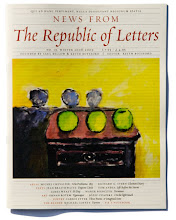Friends send me links to the small wars insistently being waged on the many battlefields of literature. One such received yesterday revealed -- shock! horror! -- that the editor of Virginia Quarterly Review (VQR), one Ted Genoways (an old Immigration mis-hearing of Genovese?) had published his own work, that there are subsidies involved, and that he is grossly overpaid (any editor who is paid at all is overpaid is my opinion) because he is a buddy of higher-ups at the University of Virginia. The link was to a pleasant site belonging to the West Coast magazine Zyzzyva, http://Zyzzivaspeaks.blogspot.com/2008/09/ted-genoways-inserts-himself.html.
I can't say I'm a regular reader of the VQR, nor of its editor's poetry. To the specifics of the case I am therefore blind -- though aroused to hear that this editorial machinery is supported in the five-zero range by that illustrious university. Mr. G. may be a good poet or he may be a bad one; the principle is the same. Editors can do as they damned please. But is this editor the fons et origo of his journal? or has he a master, the university? If the latter, he can only do as he damned pleases if he doesn't offend his master.
Now, largely speaking, universities and university presses are gentle if reluctant masters. All sorts of universities have both magazines and presses, and if they were not intellectual softies, it's hard to beieve that their publications departments -- always expensive and hugely overstaffed -- would survive. Where in this hard world of ours would a real press exist, were it not in the cozy confines of the Academy? I consider it one of the great achievements of John Silber at Boston University to have stonewalled any attempt to create such a press, though he did pass over a couple of journals such as Agni. It is likely that having once been defrauded by the late William Phillips into acquiring what was left of the Partisan Review, he didn't wish to be bitten a second time. And Agni never had more than a modest subsidy -- nothing like the VQR.
What I find especially picturesque about VQR lies in the notion that literary magazines require editorial "staff time', peer reviews, or what the Kenyon Review 's editor sententiously calls an "Editorial Tree". How many editors does it take to 'edit' a poet?
I just don't see how anyone would be startled by the ambiguities of Mr. Genoway's publishing himself. All good editors who are also writers write in their magazines. It is an essential part of their functions. Readers and subscribers are entitled to know how qualified the editor is to pass judgment on what they are given to read. If he should happen to express a fancy for one of the current voltigeurs -- say a Paul Auster -- tant pis, too bad. The high wire is a tricky place for literary toddlers. It isn't as though literary log-rolling were anything new: the Scratch Principle works up and down the literary ladder. That's how writers plan their rise, while other writers plan their rivals' fall.
Lahti
2 years ago













Keith -
ReplyDeleteTracked you down to Google. Would love to have your E-mail address so that we can catch up.
Best,
Chiz Schultz
Swisschiz@aol.com